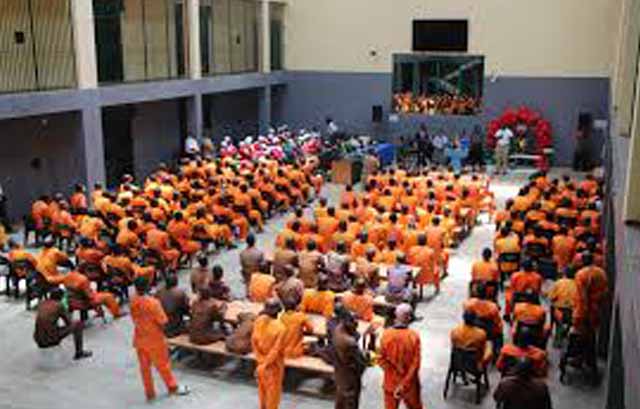By Mbongeni Mbingo | 2019-10-13

It is undisputed that the country’s economy is down on its knees, and we are surviving through divine intervention – to be overly brutal.
The situation at our hospitals is even dire; we have gone without medication for months on end, it is anyone’s guess where the money to procure some more essential drugs and medication will come from.
The reality check is there for all who visit the hospitals, or those who have had to take one or two of their relatives to the hospital.
A lot return without the much needed medication. Those who are lucky have to go via the pharmacies to supplement or purchase the drugs they need.
It is survival of the fittest. It is bad. Nurses and doctors might as well be playing card-games; there is nothing to do, and that is what many say obtains at the RFM hospital, where patients are either turned back or are ignored. The stories in our hospitals make for painful reading.
But they are a sign of the times; the hospitals are crumbling; the patients are desperate. Government has run out of money, and it can’t keep up. But it is trying, buying what it can when there is little. Government has a serious cash flow problem, akin to a well that’s dried up.
In the midst of this, public servants are struggling to make ends meet too.
They have not had a salary adjustment in three years and they are now fed up.
They want that cost of living adjustment like yesterday.
Government can’t seem to afford it and has refused to budge to the demand.
Civil servants deserve their cost of living adjustment because they have had to make do for these years, waiting for government to prioritise this, and do the right thing.
So, public servants have taken to the streets to force this essential adjustment.
Despite a serious show of force, government has insisted it does not have the money and that if it were to factor in such an adjustment for the 40 000 plus public servants, the country would crumble.
Things are bad; we are heading for disaster. The country is too deep into the dungeon.
It needs some serious financial assistance to make it through this financial year at least.
The well that was the Southern African Customs Union (SACU) has been the source of hope for years, but even that has dried a bit.
The money that comes from that customs union is no longer what it used to be, which used to fund what many refer to as a lavish lifestyle.
disguised
The SACU money made things happen, and through it a lot of things were disguised; the fact that our wage bill was too big was ignored; the warning signs that tough times were lying ahead was ignored; the fact that our exports were not anywhere near good enough was too ignored.
This country survived through borrowing to finance a lot of its projects and heavily taxing the public, thanks to the efficiency of the Swaziland Revenue Authority (SRA). But, can a country borrow to finance its wage bill? – ludicrous! Nonsensical. Never!
But there are a lot of things that go well for this country. We have a lot of positive stories to tell. And, despite a seriously depleted reserves and challenging cash flow, we are still a model to be proud of – Eswatini has done some very good things that we should be proud of.
Such things refer to the success stories around the HIV/AIDS fight; the victory around our Malaria programme; the fact that we prioritise the health of the people who need specialised treatment.
Eswatini has made huge strides in the fight against AIDS – even has an objective to end AIDs by 2022, no matter how ambitious, in addition to a vision to attain first world status by the same year.
Such visions may be costly, even if wishful. Such visions are essential to give us something to strive towards, and to make us fit into the global picture.
This country must not just sit back and wallow in self-pity. It must not sit back and be resigned to its terrible state of financial quagmire – to the point we must not engage in capital projects just because we live in abject poverty.
Eswatini has always been a middle income society, despite its size and lack of exports to boost revenues.
It has remarkably been a country that has its eyes fixed on being counted among the better African countries to live in and visit.
To do so requires that the country finds the Lilangeni to finance the important things that make us who we are.
In this regard, the E91m pledge to the Global Fund this past week should not be viewed critically as another mixed priority by the country.
On the face of it, this pledge looks like the country would have shot itself in the foot by giving to the Global Fund money it seems not to have.
It may be criticised as ill-timed, given the state of the economy and that the country’s just come out of a crippling strike by public servants demanding a cost of living adjustment government is refusing with.
But, take a closer look and it may just be the smartest move yet by the Monarch.
The pledge to the Global Fund is a determination by this country to ensure that Eswatini still benefits from the Fund – to be able to provide the much needed drugs and medication for patients who benefit from the Fund.
This speaks to patients who still need to access ARVs, TB patients and the fight against Malaria that has won this country many plaudits.
Essentially, this donation is not so out of character. Zimbabwe made a pledge of US$1 million (worth a lot more in their Zim Dollar, but more importantly, worse off than this country).
The republic of Congo pledged too. So too Rwanda. And many other countries whose economies are on their knees.
It is clear that the pledges on the night were an act of commitment to the Fund, and to the campaign to eradicate some of these diseases that African countries are struggling to deal with.
It was a pledge of political masterstroke – giving the little you have to get more out of the Fund.
Emaswati will look back at this pledge in years to come with appreciation that the Global Fund – which by the way, has stuck to Eswatini despite many calls for it to cut the umbilical cord to Eswatini – will stand by the people of Eswatini in ensuring their health is given a priority.
investment
In the short term, people will wail about the shortage of drugs in hospitals, undeniable as it is, but this is an investment into the health of the nation.
It is essential too to point out that this pledge does not have to be interpreted as an immediate donation.
For all its worth, His Majesty may come back and challenge the nation to raise money to fulfil the pledge made to the Global Fund.
His Majesty has previously asked the nation to make meaningful donations to set up funds, whose purpose are to make the lives of Emaswati better, and many have responded.
I am optimistic that the pledge may not necessarily translate to E91 million out of the government coffers, but even if it were, we should look at what we stand to gain than whether or not we can afford it.
Those who are criticising this pledge are no doubt being narrow-minded, and displaying short-termism.
Of course we can argue all day over the size of the pledge, but what remains is that had Okandaba not pledged, it would have damaged this country’s position to benefit from the Fund in the long term.
In any case, just because we are a poor country it does not mean that we should always be the country with a begging bowl.
Our pledge to the Global Fund has separated the men from the boys – and no, I am not referring to the size of our pledge!
share story
Post Your Comments Below

SOCCER- Sihlangu Semnikati head coach Zdravko Logaruši? has declared his team’s dete...

In the true spirit of Christmas, His Majesty’s Correctional Services (HMCS) will allow rela...

The leader of Esandleni Royal Kraal, Chief Prince Sisitwako II has said the ongoing national pray...
SOCCER- The Premier League of Eswatini (PLE) has extended their heartfelt wishes to all players, ...
All material © Swazi Observer. Material may not be published or reproduced in any form without prior written permission.
Design by Real Image Internet